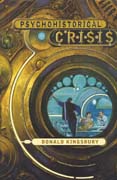 Psychohistorical
Crisis
Psychohistorical
Crisis
by Donald Kingsbury
A book review by Mark L. Olson
Tor, 2001, 511 pp, $25.95
This is a fine, but frustratingly flawed book.
For reasons which aren't apparent, Kingsbury has chosen to write a book in Asimov's Foundation universe, but evidently without Asimov's (or his estate's) permission. Kingsbury's solution is to change all the names, but otherwise to retain the storyline.
So Trantor is "Splendid Wisdom", Terminus is "Faraway", the Mule is "the Cloun", and the Second Foundation is known as the "Fellowship of Pscholars" and so forth. While jarring, this does not really detract from a fine book.
(What does detract is an obsession with pyramidology, mensuration, and the intersection of quantum mechanics and thermodynamics. From a talk by Kingsbury at Chicon 2000, a lot of the impetus for this book evidently came from his playing with theories of measurement! It's probably the biggest flaw in the book and the 5% of the book dealing with could and should have been trimmed. (It's not that it's not interesting stuff, it's that it doesn't belong in a novel.))
The story is set a thousand or so years after the establishment of the Second Empire. The Galaxy is united and peaceful and prosperous and ruled from Splendid Wisdom by the Pscholars. There's resentment and opposition, of course, just like there was in the First Empire, but it's muted and powerless.
The psychohistorical crisis (AKA "Seldon Crisis") of the title is a brilliant and should-have-been-obvious consequence of Asimov's Foundation stories: What happens when psychohistory ceases to be the exclusive province of the Pscholars but starts to be known more widely? How can the Second Foundation deal with a Galaxy of would-be psychohistorians all second-guessing it?
The answer, of course, is that the Second Foundation would try to keep a monopoly of Psychohistory and try to suppress any rivals. And therein lies the conflict in this novel. It's inevitable and it's obvious - now.
The story is set two millennia after the last of Asimov's Foundation novels. (It should be noted that Kingsbury evidently takes only the original Foundation stories as canonical - none of this robot or Gaia silliness!) Consequently, technology is far in advance of where we last saw it in Asimov's writings. While the scientific renaissance that spread from Terminus with the Foundation has ended, it went progressed further than we saw in Asimov's stories.
The key new invention is the Familiar, devised by combining the psychic probe, the visi-sonor and computer technology. The combination is a couple pound gadget that people wear on their necks or heads and which uses psychic probe technology to provide a direct link between the brain and the familiar's computer. In effect, it adds an extra lobe to a person's brain which vastly improves memory, math abilities and the like.
Kingsbury wisely dodges the cyberspace issue by pointing out that each person's internal mental "language" is private to them and necessarily completely unintelligible to anyone else - I think Hal Clement first pointed this out in one of his stories when a telepathic race first encountered Mankind and learned the internal language of the first specimen they encountered. Having laboriously learned it, they set out to conquer - only to discover that every human has his own unique mental language. Common internal languages require telepathy from birth or earlier.
Each person gets a "fam" around age 3 or 4 (earlier interferes with
proper brain development) and each person spends the rest of his life with his
fam, the fam learning the person's internal language and becoming inextricably
linked with him.
The book begins with a dramatic scene of a Pscholar being tried, convicted and
his fam executed, leaving him half a person. What did he do to deserve that? He
no longer remembers! And while he can certainly get a new fam, the process of
raising it to maturity will take years and will not result in the same man/fam
composite being that was destroyed.
The book alternates between four main lines of story: flashbacks to the semi-executed Pscholar's youth, flashbacks to rebels who have developed a rudimentary psychohistory, a modern-day rebel right on Trantor and a top-ranking Psychohistorian who believes that the Second Foundation is acting wrongly and dangerously and futilely by suppressing popular use of psychohistory.
Kingsbury does a fine job of stitching this all together making for a great
story and a superb job of extrapolation on Foundation. (Far better, frankly,
than Asimov himself or the Bear/Benford/Brin attempt.)
But I do wish he'd been edited just a bit more!
Recommended.
NESFA homepage | Review Index | More Reviews by Mark L. Olson
